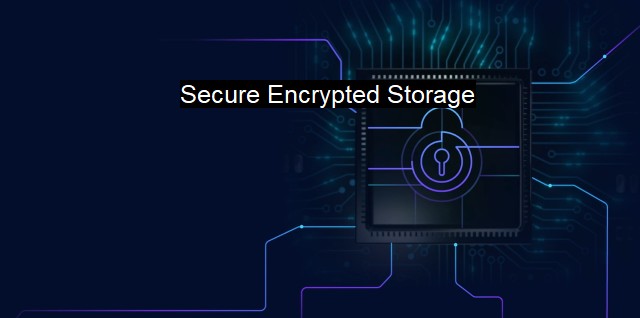What is Secure Encrypted Storage?
Secure Encrypted Storage: Protecting Sensitive Data From Cyber Attacks
"Secure Encrypted Storage" relates to the methodologies and protocols implemented to protect digital information from unauthorised access or threats in the field of cybersecurity and antivirus. It is the practice of converting data into code and storing it safely to prevent any unauthorized access. A key component in ensuring comprehensive cybersecurity, secure encrypted storage plays a significant role in mitigating the risks posed by hackers and securing sensitive information from potential threats.Secure Encrypted Storage revolves around multiple encryption procedures designed to protect information. Users can only access this encrypted data by decrypting it with a unique key, a sequence of random bits created explicitly for encryption and decryption.
The significance of secure encrypted storage lies in its approach to protecting data. In recent decades, the exponential growth of digital platforms has caused a skyrocketing increase in data production, making it an attractive target for cybercriminals. Hacking, identity theft, and data breaches are common cybercrimes committed, warranting the need for strong encryption methods for safeguarding users' sensitive information. Implementing secure encrypted storage means safeguarding data integrity by making it nearly impossible for such adversaries to interpret the stored data without the corresponding decryption key.
In the context of cybersecurity and antivirus safeguards, secure encrypted storage plays a fundamental role in making systems impenetrable. With the implementation of encryption technologies, companies can uphold stringent cybersecurity policies and rest assured of their data safety. Banks, financial institutions, and healthcare providers, who handle copious amounts of sensitive data daily are among many sectors that benefit immensely from secure encrypted storage solutions.
When talking about digital protection, one cannot overlook the role of antivirus software. Antivirus tools primarily work by scanning, detecting, and eliminating threats from a system. In comparison, encryption goes one step further, securing the stored data by making it unreadable to unauthorised users. It ensures data stored on servers, networks, emails, the cloud, or portable devices, does not fall into the wrong hands.
With the advancements of technologies, there are numerous methods of encryption now available, divided mainly into two categories: Symmetric and Asymmetric Encryption. Symmetric encryption uses the same key for both encryption and decryption. This type is often used for bulk data encryption for its superior speed and lower resource use. Asymmetric encryption, also known as public key encryption, uses different keys for encryption and decryption. One key is public, while the second, private one is kept secret. This method is widely used for secure communication over the internet.
Standards used globally, like Advanced Encryption Standard (AES), define encryption algorithms. AES, with 256-bit keys, is one of the most robust encryption standards that are virtually impossible to breach with brute-force attacks.
Secure encrypted storage, crucial in the realm of cybersecurity and antivirus protocols, acts as the defender of digital information. The secure encrypted storage approach ensures businesses can operate in a safe, secure environment with reduced risks of data breaches. With evolving ways to protect against cyber-attacks, encrypted storage opens a new layer of defense in the security ecosystem. From protecting sensitive details to securing a device wholly, secure encrypted storage's application is wide-reaching and continues to be a critical asset in combating privacy concerns in this digital age. This discussion undoubtedly underscores the relevance of encrypted storage in our daily life, emphasizing its paramount importance for safe digital interactions.

Secure Encrypted Storage FAQs
What is secure encrypted storage?
Secure encrypted storage is a method of protecting data by encrypting it before it is stored, ensuring that it can only be accessed by authorized users with the correct decryption key. This helps to prevent unauthorized access and theft of sensitive information.How does secure encrypted storage help with cybersecurity?
Secure encrypted storage adds an extra layer of security to data protection. Encrypting stored data makes it much harder for hackers and cybercriminals to access sensitive information, even if they manage to breach other security measures.What are the advantages of using secure encrypted storage?
Secure encrypted storage provides several advantages, including increased data security, protection against data breaches, and greater peace of mind for individuals and businesses. Encrypting stored data also helps to ensure compliance with data protection regulations, such as GDPR.What antivirus software is best for use with secure encrypted storage?
The best antivirus software for use with secure encrypted storage is one that incorporates advanced security technologies such as behavioral analysis, machine learning, and anti-phishing protection. Popular antivirus solutions like Norton, McAfee, and Kaspersky are all trusted options that provide a comprehensive suite of security features to protect against a wide range of cyber threats.| | A | | | B | | | C | | | D | | | E | | | F | | | G | | | H | | | I | | | J | | | K | | | L | | | M | |
| | N | | | O | | | P | | | Q | | | R | | | S | | | T | | | U | | | V | | | W | | | X | | | Y | | | Z | |
| | 1 | | | 2 | | | 3 | | | 4 | | | 7 | | | 8 | | |||||||